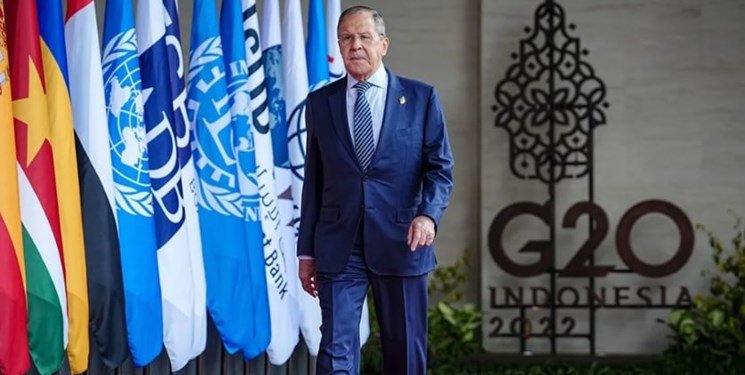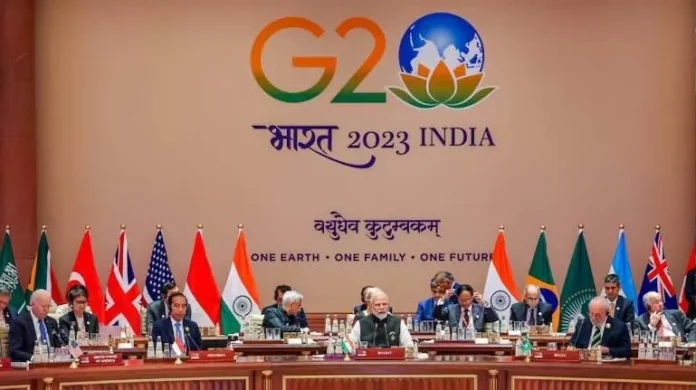India declared to the world with great pride and enthusiasm that a consensus was reached on the 37-page New Delhi Declaration on the very first day of the G20 summit in New Delhi, which often is a tough feat to accomplish in the previous summits. India was able to bring together all countries and therein imbibe the true spirit of ‘One Earth, One Family and One Future’. In times of conflict and crisis, North-South divide, climate challenges, and constraints in global supply chains, the G20 Presidency has made ‘India world-ready and the world India-ready’ as quoted by Minister of External Affairs S. Jaishankar.
Russia-Ukraine Conflict
In the uncertain geopolitical atmosphere, India was able to seek a consensus on the Russia-Ukraine conflict. Paragraph 8 – For Planet, Peace and Prosperity of Leaders’ Declaration observes that states must refrain from acquiring territory against the territorial integrity and sovereignty of the state. It further notes that the use or threat of using nuclear weapons was inadmissible signalling to overtures put forth by Russian President Vladimir Putin at a point in time in the Russia-Ukraine conflict. The language put forth in this paragraph is in the lines of the UN Charter and seems to appear as a passive warning of Russia’s aggressiveness in the conflict. The smart diplomatic drafting of the text has gained consensus and trust among all the member states of G20. Ukraine was however evidently disappointed with the final communique in Delhi as it did not overtly condemn the Russian invasion of Ukraine. Russian Foreign Minister Sergey Lavrov was quick to note that Ukraine was not made the central point of the agenda in G20 talks.
Inclusion of the African Union in G20
In the opening remarks of Prime Minister Narendra Modi at the G20 summit, he recognised that there is a global trust deficit in addressing the crises impending the globe at large. He advocated an inclusive human-centric approach to addressing decades-old challenges that required fresher solutions. The crisis of mutual trust can be overcome through the slogan of ‘Everyone’s Support, Everyone’s Development, Everyone’s Faith and Everyone’s Efforts. It is this very spirit of inclusiveness, trust-driven development, and teamwork that India proposed the permanent membership of the African Union (AU) in G20.
It is worthwhile to recall that G20 member countries represent around 85 per cent of the global GDP, over 75 per cent of the global trade, and about two-thirds of the world population. If that is the case, the voice of Global South rightly deserves representation and their insights and experiences need to be heard. AU comprising 55 member states is home to 60 per cent of the world’s renewable energy assets and more than 30 per cent of the minerals important to renewable and low-carbon technologies. AU and its membership will prove crucial to discussions as Africa poses central to global issues such as food security, migration and climate change. The inclusion of AU is viewed strategically as giving the region a voice in the global state. AU membership of G20 stands in line with India’s sustained engagement in the Global South and in certain ways counters China’s engagement in Africa.

India-Middle East-Europe Economic Corridor
The India-Middle East-Europe Economic Corridor (IMEC) proposes to have two corridors – the east corridor connecting India to the Arabian Gulf and the northern corridor connecting the Arabian Gulf to Europe. The proposed corridors include a railway network to offer cost-effective cross-border ship-to-rail transportation. Along the railway route, it is envisaged to lay cables for electricity and digital connectivity, as well as pipe for clean hydrogen export. The corridor aims to secure regional supply chains, increase trade accessibility, improve trade facilitation, and support an increased emphasis on environmental, social and government impacts. Indian Railway Minister Ashwini Vaishnaw assured that the IMEC project stands bankable, revenue-based and substantially different from China’s flagship Belt and Road Initiative (BRI). The BRI has recently been plagued by mounting concerns over its debt sustainability and the economic slowdown in China. With growth rates on a slump and debt levels on the rise, questions are being raised on the sustainability of the BRI. It has also been reported that Italy wants to exit the project.
Global Biofuel Alliance
The G20 members agreed on phasing out unabated coal power, trebling investment in renewables and doubling targets under energy efficiency by 2030 for a smoother energy transition and on the creation of the Global Biofuel Alliance. PM Modi proposed to blend ethanol in petrol up to 20 per cent. Such a blending mix aims to ensure a stable energy supply and provides for climate security. Biofuels help in reducing carbon dioxide emissions and go a long way in reducing net zero carbon emission targets. India launched the Global Fuel Alliance (GBA) gathering support from 19 countries and international organisations. It aims to develop an alliance of governments, international organisations and industry to facilitate the adoption of biofuels. Indian Petroleum Minister Hardeep Singh Puri remarked that the adoption of biofuels is a historic step in the quest for cleaner and green energy. G20 adopted the Green Development Pact (GDA) for a sustainable future. The Delhi Declaration endorses high-level principles on lifestyle for sustainable development, voluntary principles of hydrogen, the Chennai principles for a sustainable resilient blue economy and the Deccan principles on food security and nutrition among others. India also proposed to replace the Carbon Credit Scheme with the Green Credit Initiative. It is an initiative to encourage behavioural change by incentivising environmentally sustainable and responsive actions by companies, individuals and local bodies.
Key Outcomes
A softer language on the Russia-Ukraine war reflects that the geopolitical tensions in the world cannot be the grounds for fracturing G20 talks. Development prioritises over conflicts. The voice of the Global South with the inclusion of the African Union gives emerging market economies, and less developed countries a rightful place on the global stage. It is time to realise the potentialities and opportunities of Global South provided that due support and assistance are facilitated by Multilateral Development Banks (MDBs). The corridors of connectivity between Asia and Europe (IMEC) are an opportunity for all stakeholders and could act as a bulwark to China’s BRI. G20 discussions in Delhi did lay grounds for incremental progress in climate change and sustainable development. India’s G20 Presidency showcases that troubling, divergent, innovative issues can be resolved for a better future.
-The writer is Assistant Professor, School of Law, Presidency University, Bengaluru. Views herein expressed are personal.
–The writer is Assistant Professor, ICFAI School of Liberal Arts, ICFAI University, Jaipur. The views expressed are of the writer and do not necessarily reflect the views of Raksha Anirveda

















